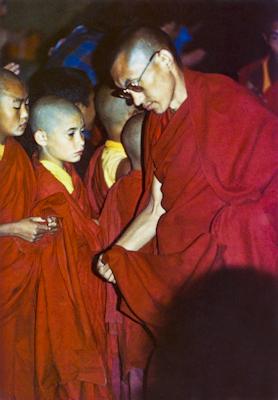What is Dharma?
Excerpted from Rinpoche’s introduction to the Fifth Meditation Course, Kopan Monastery, October 1973. Edited by Nicholas Ribush. Printed in the June 2001 issue of Mandala magazine.

The Sanskrit word “Dharma” refers to that which guides, or saves, our mind from suffering. However, there are thousands upon thousands of different types of suffering and even within these, there can be many different kinds. For example, within illness, there are hundreds of different kinds.
As there are many different kinds of illness, so too are there hundreds of different kinds of medicine. But all these different medicines are for the purpose of curing disease, for saving people from the suffering of illness, and are, therefore, all medicine. Similarly, within the Dharma, there are thousands of different kinds of Dharma practice, but they are all Dharma.
But the effect of external medicine is vastly different from the effect of Dharma; as different as earth is from sky. External medicines are only temporal methods--they offer only temporary relief; they don’t cure disease permanently. Medicine can stop illness for a short time but it can never prevent it from recurring. This is easy to understand; it’s common experience and shows that medicine is only a temporal, not an ultimate, method. Sometimes medicine doesn’t even work at all, solves only part of the problem, or itself causes other physical or mental problems to arise. Medicine is by no means an ultimate way of dealing with disease.
The effect of Dharma is completely different. No matter how long you practice Dharma, you always benefit. Your body, speech and mind become more pure and there’s never any danger to your body or your mind--unless, of course, you practice the wrong Dharma. That can lead you into trouble.
Some people take drugs to feel good. If you carry on taking drugs in the belief that they’ll always produce the same effect, you can drive yourself crazy or otherwise endanger your life. Drugs make your mind increasingly unconscious, your body, speech and mind less disciplined and jeopardize your precious human life.
Dharma practitioners don’t need drugs. Their dependence on drugs has finished. Drugs are for those whose minds are limited, who have no idea of Dharma or the meaning of life, who have no understanding of past and future lives, who believe just the limited phenomena they see before them.
Similarly, all the normal, everyday things we do to protect ourselves from suffering, the kinds of things that animals do, are also merely temporal methods. Eating, drinking, wearing clothes, doing our jobs--none of these are ultimate methods that will put an end to suffering forever. No matter how highly we develop materially and technologically, none of this will put a final end to problems.
In ancient times, long before our modern, material development, people had problems. The very first humans on earth had many problems--mental problems, life problems, suffering, dissatisfaction. Nowadays, there’s even more confusion, fighting and suffering. Over the millennia, there’s been a much greater increase in suffering than in peace. You just have to look around to see that this is true. This again shows clearly that external, material development is not an ultimate solution to problems. It shows that something’s missing, that material development alone is not enough.
I’m not saying that science and material development are bad; I’m simply describing what’s happening around us.
Why can medicine, drugs and every single thing we do not put an end to temporal problems? Because they do not affect the cause of these problems.
This proves that the actual cause of suffering is not in the external conditions. This is important. If you understand this, you understand the essence of Dharma. It also proves that everything we have ever done has not touched the cause of suffering. Why do these external methods fail to cease all suffering and its cause? Because the cause of suffering is not in the external conditions but in our minds. The cause of suffering is not in external factors but in the mind of each of us. Whether we are humans walking on the earth, worms in the ground or insects in the air, the cause of suffering is within our minds. Therefore, we cannot escape from physical or mental suffering by going underground or flying to the moon.
Trying to solve a problem by traveling to another place instead of attacking its cause is like going for a run to get rid of a pain in your stomach. Instead of alleviating the pain, you simply make yourself tired and hungry. We think this example is stupid and childish, but actually it describes just the way we are. We’re doing the same thing; we just don’t recognize it. Running from suffering by train or plane instead of trying to recognize the cause of the problem and discover the right way of solving it can never be effective.
What kind of method should we all practice; what kind of method can destroy all suffering and its cause? An internal method—in other words, Dharma. Dharma is the inner method that can cease all suffering and its cause. By “cease” I mean put a complete end to all physical and mental suffering such that it can never recur. This inner method, Dharma, is beyond compare with any temporal method, because through the practice of Dharma, this one action, billions of different sufferings and their cause can all be destroyed.
